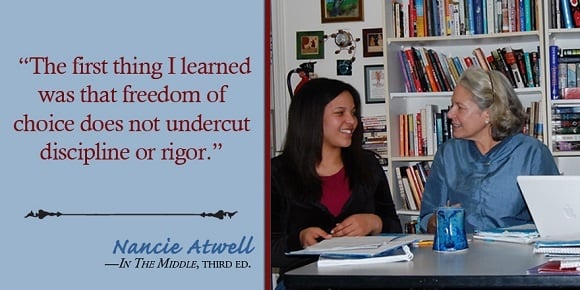 The updated third edition of In The Middle along with its predecessors.
The updated third edition of In The Middle along with its predecessors.
Have children’s needs changed in the four decades you’ve been teaching? What about their goals, strengths and interests? What makes you say the workshop is still the best way to teach English?
Kids’ interests change, but kids don’t. While there are always new books, television shows, games, singers, and styles to like, what adolescents are like remains the same.
Seventh and eighth graders are preoccupied with peers: they come to school primarily to see one another. Their physical restlessness is legendary—I think the word antsy was coined to describe them. They’re at an age when they still know they don’t know everything and unlike most high school students, can display unrestrained enthusiasm for ideas and concepts, facts and explanations, books and poems and stories. They get jokes and appreciate metaphors, sarcasm, and irony. They question authority—not to be obnoxious but because they genuinely desire to know why. They want meaning, and they look to us adults for a sense of purpose in work and life.
While in the process of trying to figure out who they are, they also ask to be seen and responded to as individuals. Finally, they want some say in what they’re being asked to do—to make academic decisions and discover their own ends as learners.

A writing-reading workshop is the best way to teach English K–12, but especially to young adolescents. It accommodates who they are, stretches them, and points the way to a worthwhile version of adulthood. The workshop is a healthy, productive, meaning-filled way for kids to channel social, physical, intellectual, and personal needs.
Students in a workshop talk—about their experiences and observations, tastes and preferences, confusions and misunderstandings, ideas and discoveries. Their social needs find a legitimate and powerful forum in on-the-job conversations and discussions with peers.
Students in a workshop move—with purpose—among the areas of the classroom that meet their various needs as writers and readers, from computer to materials center to file cabinet to reference shelf to classroom library to books-we-love to display to peer conference area. There’s little evidence of pent-up energy and much engagement.
In addition, the minilesson⇒independent writing⇒booktalks⇒independent reading pattern of a workshop creates the transitions I was taught in college methods courses are essential for adolescents, as well as a balance of whole group, small group, and independent activity.
Students in a workshop grow intellectually in the company of knowledgeable, enthusiastic teachers who demonstrate passion and conviction about what we’re teaching. We talk with kids about the books, authors, poems, and poets that changed our lives and we think will change theirs, too; show them techniques of writing and approaches to criticism that help them create literature and unpack it; and present a version of the language arts that’s stimulating, intriguing, and genuine.
And students in a workshop grow personally. In the books and poems they read, they encounter injustice, learn empathy, and meet people who challenge and enlarge their view of the world. Through the poetry, stories, reviews, essays, and journalism they write, they gain self-awareness, perspective, maturity, and a voice.
Writing-reading workshop is the best way to teach English because it makes school make sense, for kids and their teachers, because the work is authentic, and because child intentionality and teacher knowledge are an unbeatable combination.
This blog post is part of the In The Middle Wednesdays series. Please visit http://www.heinemann.com/InTheMiddle to learn more about the book and read chapter previews.


